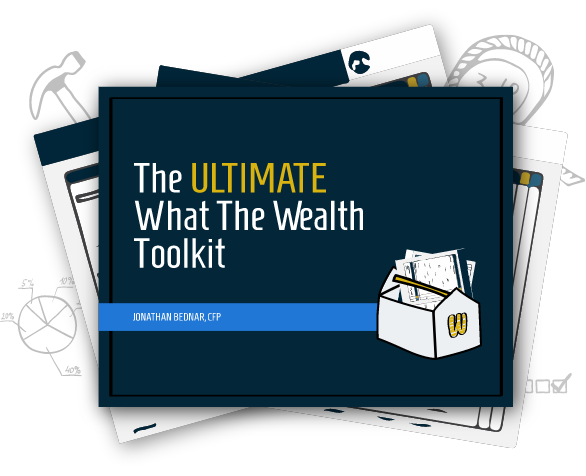Today’s topic, estate planning, is often a touchy one. It brings up fears of our own, our spouse’s, or our parent’s mortality, and no one likes to think about their death or the death of their loved ones.
And if the fear of mortality doesn’t prevent us from creating an estate plan, we don’t do it because we think we don’t really need one, or it’s too expensive, or we’re too young, that estate plans are things those in their 80s need to worry about.
I’m here to tell you that none of those things is true, and no matter how unpleasant it is to plan for illness or death, creating an estate plan is a must-do for absolutely everyone reading this who is over the age of 18, especially if you have people who depend on you; a spouse, children, grandchildren, or other family members.
It Can Happen To Anyone
I recently got a call from a client that all CFPs dread. His wife was comatose in the ICU, and he didn’t know the outlook. Of course, he hoped that she would recover and they could resume the life they had always known, but it was too early to know, and he wanted to start preparing for the worst.
But the couple had never taken my advice and created an estate plan, so there wasn’t much we could do. As the next of kin, the husband was entirely responsible for making healthcare and financial decisions for his wife. I hope they had spoken privately about their wishes, but I don’t know. If they hadn’t, the husband would be left to guess what his wife would have wanted. An insanely stressful situation to be in during an already stressful time.
Four Basic Documents
There are 5 big retirement risks: behavior, taxes, withdrawal strategy, inflation, and longevity. When I meet with new clients and we’re going through the financial planning process, I ask them if they have an estate plan. 95% of the time, they don’t.
It’s the longevity risk that I use to bring up the topic. None of us knows how long we’ll live, but we all know that it won’t be forever, even though we don’t like to think about it.
While you can go deep into the weeds when it comes to creating an estate plan, there are four basic estate planning documents that are non-negotiable. These documents are your frontline defense to protect your wishes and your family.
A Will
A will is a simple document that lays out where you want your assets to go after your death and who you want in charge of making sure that happens. You want your estate to go to your spouse or your children if your spouse predeceases you, for example.
The person overseeing that your wishes and the probate process are carried out is the executor. The executor can be a family member, friend, or professional like an attorney or accountant.
Health Care Directive/Living Will
This document details what health care measures you want in the event you can’t state your wishes. Do you want to be put on a ventilator, do you want no measure spared to keep you alive, do you want to donate your organs? These are all terrible decisions for a family member to make on your behalf, so don’t put them in that position.
Healthcare Power of Attorney
This document allows a person you designate to access your medical information, including speaking to your healthcare providers and obtaining your medical records. Your healthcare POA doesn’t have to be the executor of your estate, but it can be.
Financial Power of Attorney
This document allows a designated person to access your bank and investment accounts, pay your bills, and make other financial decisions if you can’t make them on your own. Again, your financial POA doesn’t have to be the executor of your estate, but it can be.
DIY?
There are online services that allow you to create these four estate planning documents yourself, but I don’t recommend them. I prefer clients bring in an expert like an estate planning attorney. Estate planning laws vary by state, so using a local attorney ensures that the documents comply with local laws.
The other reason is that attorneys specializing in estate planning also understand things like human emotions and family dynamics that can come into play and help you navigate those touchy areas.
Yes, an estate planning attorney is more expensive than an online DIY legal document site, but not as expensive as you think. And much less expensive than not having those critical documents when the time comes, both in terms of money and the well-being of your family. Something I know none of us would skimp on.
If you need help with financial planning, estate planning, or finding the right attorney, reach out, and I’m happy to discuss it with you.
Paradigm Wealth Partners and LPL Financial do not provide legal advice to services. Please consult your legal advisor regarding your specific situation.
Listen to the Full Episode:
What You’ll Learn In Today’s Episode:
- The top three excuses for not having an estate plan.
- The five big risks of retirements.
- When you should start thinking about having an estate plan.
- The four documents you absolutely need in an estate plan.
- The importance of having someone who understands the laws around estate planning.
Ideas Worth Sharing:
“I cannot stress enough how important it is to have an estate plan.” – Jonathan Bednar
“If something happens to you, who gets your assets? And who is in charge of making sure that the probate process is completed?” – Jonathan Bednar
“These four documents are an absolute must-have, and if you don’t have them, it’s something you need to focus on in the first quarter of 2022.” – Jonathan Bednar
Resources In Today’s Episode:
- Jonathan Bednar: Email | Twitter | LinkedIn
- What The Wealth?! by Jonathan Bednar
Enjoy the show? Use the Links Below to Subscribe:





